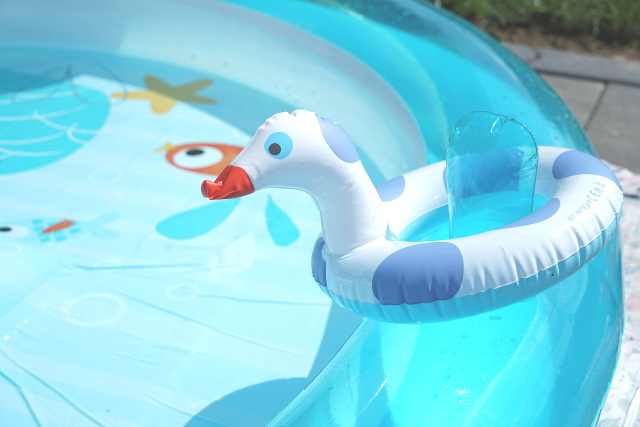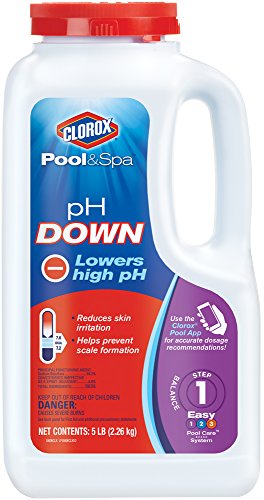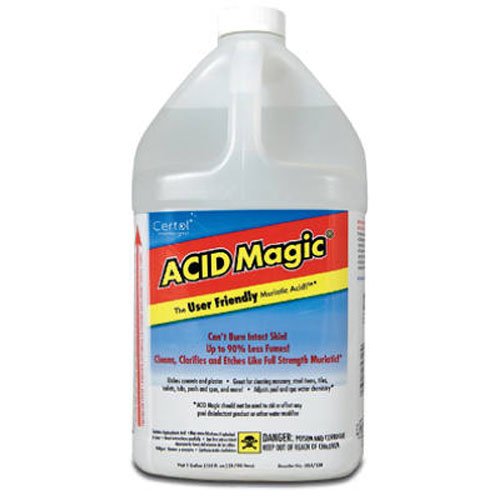Nothing gets the little ones more excited to be outside than a kiddie pool. It provides much-needed exercise, boosts stress management, and helps parents make bedtime a whole lot easier. But just because the pool is fun-sized, doesn’t mean the water chemistry should be taken any less seriously.
With hundreds of chlorine products to choose from, finding the best option is no easy task. That’s why we put together this guide, highlighting five of the best chlorines for kiddie pools that are available today.

Article Contents
What to Consider When Choosing Chlorine for a Kiddie Pool
You want your kids to be safe while they’re having fun. So when it comes to kiddie pools, a proper water chemistry balance always starts with chlorine. The right chlorination product will eliminate the various germs that cause Swimmer’s Ear and diarrhea, not to mention dangerous bacteria like E. coli and salmonella.
Chlorine may be the most important ingredient of balanced and healthy water chemistry, but it isn’t the only one. Before you shop for specific kiddie-pool chlorine products, there are at least three major factors to consider.
pH Balance
Maintaining the right pH balance doesn’t just make your water clearer. Effective chlorination can’t physically happen when the pH is too high. And when it’s too low, the water is no longer safe for kids.
As such, your number one priority beyond sanitation should be balancing the pH to an optimal range of 7.4-7.6.
A normal pool requires the pH to be checked once a week. But because kiddie pools and paddling pools are much smaller, we recommend measuring the 3 times a week or more, and adjusting as needed. You can do this with test strips.
- Suit pools and spas
- Tests 7 things including chlorine, bromine, pH, cyanuric acid
- Quick & easy to use
To raise the pH, you can use any of the below:
| Image | Product | Features | Link |
|---|---|---|---|
 |
| 9.7 | Check Price |
 |
| 9.5 | Check Price |
 |
| 9.1 | Check Price |
Most types of chlorine lower the pH, so you’ll rarely need to lower it manually. That said, it’s always best to stay prepared with one of these pH Down solutions:
| Image | Product | Features | Link |
|---|---|---|---|
 |
| 9.7 | Check Price |
 |
| 9.5 | Check Price |
Chlorine Stabilizer
When it comes to kiddie pools, most experts recommend using a stabilized chlorine product. That’s because getting the chlorine and stabilizer balance right is more difficult when dealing with smaller pools so it’s easiest to use chlorine with a stabilizer already in it.
Stabilizer chlorine has cyanuric acid in it, which protects it from degradation in the sun. Chlorine will last much longer with a stabilizer in it. Without it, chlorine degrades in a few hours making it ineffective.
If you still decide to use non-stabilized chlorine, like bleach, you can add a stabilizer separately. Like this one:
- Stabilizer aka cyanuric acid
- Helps make chlorine last longer
- For salt or chlorine pools
But if you want to steer clear of extra risks (and extra chores), go with a Trichlor or Dichlor-based granular chlorine.
How to Add Chlorine to Kiddie Pools
Each type of chlorinating product comes with specific instructions. Adding chlorine to a kiddie or inflatable pool is similar to adding chlorine to a full-size pool.
In most cases, these instructions involve additional equipment that must be bought separately. Regular household bleach is the only chlorine that can be poured directly into the water.
- For liquid chlorine (i.e. bleach): Always dilute liquid chlorine in a bucket of water before adding it to a kiddie pool. Since none of the liquid products are stable, don’t forget to add a stabilizing agent afterward.
- For tablets: Never toss a chlorine tablet directly into a pool. Instead, use a chlorine floater. We recommend floaters, as they are the least expensive option and they require the least effort to use.
- For granules: Dissolve granules in a large bucket of water first. You don’t want undissolved granules coming into contact with your pool’s floor or your child’s feet.
You can get a chlorine dispenser here:
- Holds 1" Chlorine / Bromine Tablets
- Adjustable flow control
- Best for small pools/hot tubs etc.
#1 – HTH Super Chlorinating Tablets
HTH’s new Chlorinating Tablets are an all-around great product for kiddie pool sanitation. Tablets slowly dissolve which means they will slowly release chlorine over time. Saving you the effort of continually adding chlorine.
- Sanitizes and protects your pool water
- Compatible with vinyl-lined pools and saltwater systems
- Kills bacteria and algae
A single tablet is enough to sanitize 10,000 gallons (37,854 L) of water for up to seven days. Since your kiddie pool or inflatable pool is likely to hold a fraction of that, try breaking the tablet into quarters.
HTH’s tablets are stabilized with plenty of cyanuric acid (CYA) to protect the water from losing chlorine in direct sunlight.
HTH is a trustworthy brand, whose parent company Sigura has been in the pool maintenance sector for decades. The formula for their 3-inch tablets is 93.6% Trichlor (Trichloro-s-Triazinetrione), and 3.5% Zinc (Zinc sulfate monohydrate). Trichlor is among the most effective chlorinating agents available, while Zinc is added to prevent corrosion.
But what really makes the Super Chlorinating Tablets stand out is the slow-release formula. That makes it ideal for ongoing chlorination. And the sub-$50 price tag of a 5-pound box makes it one of the most affordable chlorine products on the market.
- Stabilized
- Slow dissolving tablets
- Compatible with vinyl, inflatable pools
- Requires additional equipment (floater/skimmer/feeder)
- Not a pure chlorine product
#2 – Clorox Bleach
Our list just wouldn’t be complete without good ol’ Clorox Bleach. It may not be the most purpose-built option, but it is by far the least expensive and easiest option. In fact, even though household bleach is only 6% chlorine, it still gives you much more bang for your buck, while thoroughly disinfecting the water.
- 8.25% strength bleach is (also known as liquid chlorine or sodium hypochlorite)
- Use in pools & spas
- Mixes immediately & instantly raises chlorine levels
Unless you want to add bleach every day, it’s highly recommended you also add a little stabilizer aka cyanuric acid. This will prevent chlorine from degrading.
Being a household name, Clorox also provides parents peace of mind – you can be sure the chlorine concentration is precisely the same in every container. The Clorox website also has a handy chart to help you get your measurements just right. And that’s not to mention the fact that if you’re ever running low, you can get a refill at just about every department store in the country.
- Trusted brand
- Wide availability
- Lowest price
- Only 6%
- Not stabilized
#3 – EcoOne OneShock Granular Chlorine
The OneShock Tablets are EcoOne’s newest specialty chlorine tabs designed for spas and small pools. Their 2lb container is packed with 64 tablets capable of sanitizing the water for an entire week.
- The world’s first sanitizer and shock treatment combo tablet
- No mixing or measuring required
- Contains less dangerous chemicals
Furthermore, kiddie pools containing under 1,000 gallons (3,785 L) will only require one tab per use. That means just one container of OneShock is enough to keep an inflatable pool disinfected for over a year straight.
EcoOne’s granular chlorine really lives up to the brand’s name. Unlike the vast majority of chlorine (CI) tablets, the OneShock dissolves completely without leaving behind undissolved chunks.
- Stabilized
- Easy application thanks to small-sized tablets
- Contains minimal levels of skin irritants
- Dissolves Completely
- Pricey compared to similar products
- Requires additional equipment
#4 – Champion’s Liquid Chlorine Pool Shock
With a chlorine concentration of 12.5%, Champion’s Liquid Pool Shock is our go-to liquid solution for kiddie pools. It is more than twice as potent as household bleach, which comes with a number of hidden benefits aside from only needing to add half as much chemicals to your pool.
- Commercial-strength liquid chlorine (aka bleach or sodium hypochlorite)
- Rapidly eliminates algae, bacteria, and other contaminants, ensuring crystal-clear water
- Safe for pools & spas (saltwater & chlorine systems)
- Use as a shock or regular sanitizer
You will also end up with a cleaner, safer pool due to the increased levels of FAC (Free Available Chlorine). To help you visualize how steep the difference is, imagine two one-gallon buckets of water – one with an added gram of Clorox, and another with a gram of Champion’s liquid chlorine. Within minutes, the Champion’s bucket measures around 0.5 FAC, while the Clorox bucket FAC level is maxed out at 0.04.
- Low cost compared to tablets
- High FAC concentration
- Requires half the storage space of Clorox
- Not stabilized
- Raises water hardness level
#5 – Spa Choice’s Spa Sanitizing Chlorine Granules
- Dissolves quickly and completely
- Stabilized spa chlorine
- Controls algae
Originally designed for spas and hot tubs, Spa Choice’s Spa Sanitizing Chlorine Granules are our overall best chlorine pick for kiddie pools. It comes in a small pack size which is ideal for kiddie pools. Don’t be put off by the fact it says it’s for hot tubs. It’s the same chlorine used in pools, except it’s in a smaller pack size. This product is based primarily on Dichlor. It dissolves faster than any other granular chlorine, it’s protected by stabilizing agents, and it’s relatively safe to handle and store.
But what really makes these granules the optimal choice for kiddie pools is their almost-neutral pH (around 6.8). That means less testing and adjusting acidity for you, and less waiting time for your little ones! To top it off, Dichlor has the longest shelf life of any granular chlorine product.
- Fast-acting
- pH neutral
- Safe to transport
- Easy to store
- More expensive than Trichlor tablets
Related Reading:
5 Ways to Keep a Kiddie Pool Clean (Best Tips from a Dad)
Which Chlorine to Use for Inground Pools?
Which Chlorine to Use for Intex Pools?
Which Chlorine To Use For An Above Ground Pool
Which Chlorine to Use for Fiberglass Pools?









